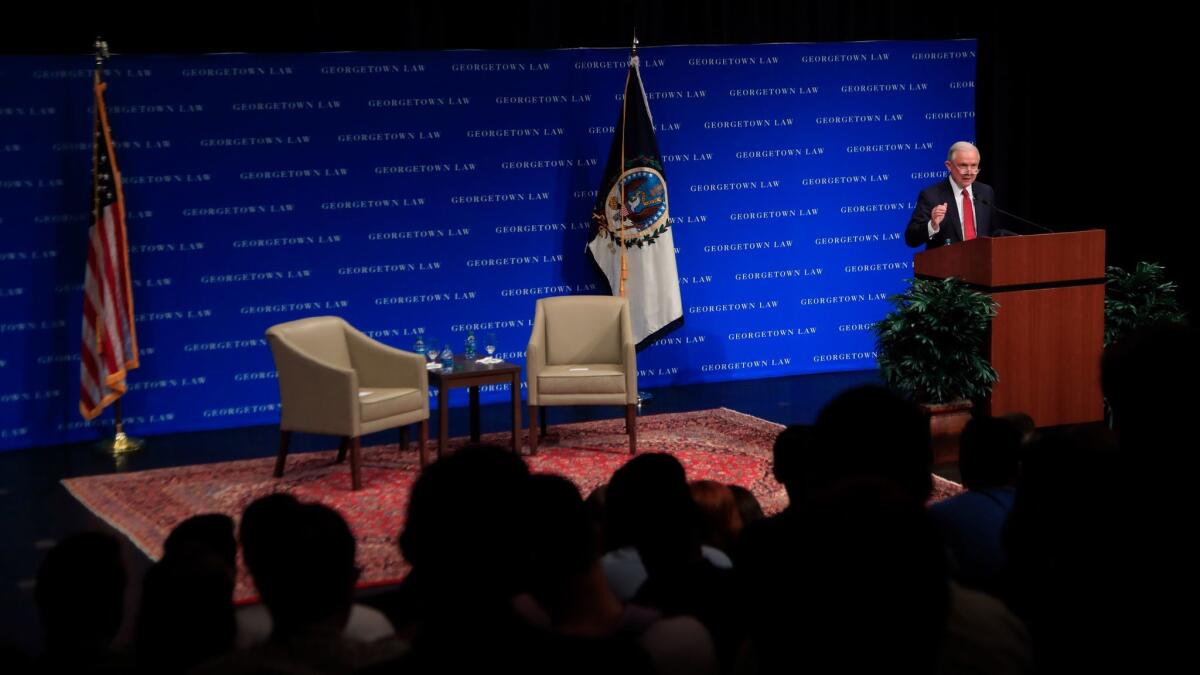Editorial: Students deserve to be punished for shouting down campus speakers, but don’t go overboard

- Share via
We don’t agree with Atty. Gen. Jeff Sessions on much, but he was right when he warned last month that on college campuses “protesters are now routinely shutting down speeches and debates across the country in an effort to silence voices that insufficiently conform with their views.” And he was right to call for a “national recommitment to free speech on campus.”
But what should such a “recommitment” look like? Was it reasonable — or was it overkill — for the University of Wisconsin system to adopt a new policy earlier this month that provides for the expulsion of any student who has been found three times to have engaged in “violent or other disorderly conduct that materially and substantially disrupts the free expression of others”?
In our view, students who shout down speakers or significantly disrupt their presentations are betraying the principle of free expression that is central to higher education, and serious violations justify discipline. But universities need to be careful not to overreact.
Since Sessions spoke on Sept. 26, there have been several incidents in which protesters have shut down or disrupted speakers on college campuses, denying students who wanted to hear them the opportunity to evaluate the speakers’ ideas.
Even racist speech, even hate speech, even repugnant ideas deserve protection.
On the day after Sessions’ speech, for instance, Claire Gastañaga, a lawyer for the American Civil Liberties Union, was scheduled to speak at the College of William and Mary in Virginia on the subject of “Students and the 1st Amendment.” But students from the college’s Black Lives Matter chapter — chanting “The oppressed are not impressed” and “Liberalism is white supremacy” — stopped Gastañaga from speaking a few minutes into her remarks. They were protesting the ACLU’s defense of the right of white nationalists to assemble in Charlottesville, Va.
Just last Monday, a Texas state legislator’s speech was canceled at Texas Southern University after protesters disrupted him with shouts of “When a racist comes to town, shut it down.” And on Wednesday, the controversial social scientist Charles Murray was met by students who turned off the lights in the room, set off the alarms on their phones, played music and chanted: “Racist, Sexist, KKK; Charles Murray go away.”
All of these incidents involve protesters who believed that they were justified because the speakers, in their view, were either racists or abettors of racism. Increasingly one hears the argument — and not only on college campuses — that racist or “hate” speech is a form of violence and shouldn’t be tolerated.
Although that argument may have gained force since the rise of the so-called “alt-right” and the election of President Trump, it isn’t new.
More than 40 years ago, protesters at Yale University stopped a debate featuring William Shockley, a Nobel Prize-winning physicist who believed that blacks were less intelligent than whites. A committee appointed after the incident issued a resounding defense of free speech — “We value freedom of expression precisely because it provides a forum for the new, the provocative, the disturbing, and the unorthodox” — and faulted various elements of the Yale community for failing to defend that principle. But one member of the committee, a graduate student named Kenneth Barnes, dissented, arguing that “free expression is an important value, [but] it is not the only value which we uphold. … Under certain circumstances, free expression is outweighed by more pressing issues, including liberation of all oppressed people and equal opportunities for minority groups.”
Barnes was off base. Even racist speech, even hate speech, even repugnant ideas deserve protection, because once we say that free expression may be subordinated to other values, someone has to decide exactly which values justify censorship. And what if there is a difference of opinion on that question between the university administration or a student organization and a determined band of protesters? Racist talk may be banned today, but tomorrow it might be “subversive” talk or criticism of the government or anti-racist talk, depending on who is in charge of making the rules.
The Yale report concluded that “every member of the university has an obligation to permit free expression in the university. No member has a right to prevent such expression.” It distinguished between forms of protest, such as wearing armbands or even “briefly booing, clapping hands or heckling” — and disruption that actually prevented a speaker from communicating his or her message. It concluded that failure to end disruptive activity “in response to a reasonable request for order is a punishable offense.” (In fact, Yale suspended 11 students for their participation in disruption of the Shockley debate.
Students who shout down a speaker should face discipline. We supported UC Irvine when it suspended a Muslim student group and disciplined some of its members after they disrupted a speech by Israel’s ambassador to the U.S. But we also believe universities should be prudent in imposing discipline, recognizing that college is a learning experience and that expulsion should be a punishment of last resort.
The University of Wisconsin’s policy rightly reserves expulsion for repeat offenders, but its also should define disruptive “disorderly conduct” narrowly. A student shouldn’t face discipline for carrying a sign or briefly heckling a speaker.
Now as in the 1970s, college campuses are buffeted by political and cultural cross-currents that lead to passionate advocacy but also to an unwillingness to hear — or allow others to hear — repugnant views. When objection turns into obstruction, there should be consequences.
Follow the Opinion section on Twitter @latimesopinion and Facebook
More to Read
A cure for the common opinion
Get thought-provoking perspectives with our weekly newsletter.
You may occasionally receive promotional content from the Los Angeles Times.









